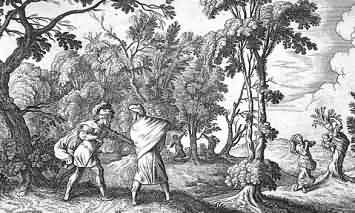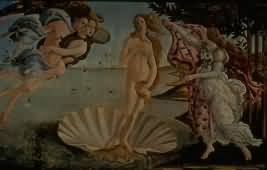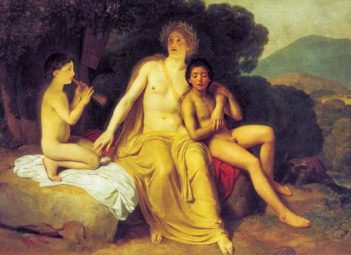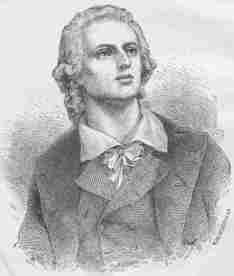
Chapter VIII: Pygmalion, Dryope, Venus and Adonis, Apollo and Hyacinthus

"Pygmalion and Galatea",
by LOUIS-JEAN-FRANÇOIS LAGRENÉE 1781,
The Detroit Institute of Arts, Detroit
PYGMALION saw so much to
blame in women that he came at last to abhor the sex, and
resolved to live unmarried.
He was a sculptor, and had made with wonderful skill a statue of
ivory, so beautiful that no living woman came anywhere near it.
It was indeed the perfect semblance of a maiden that seemed to be
alive, and only prevented from moving by modesty. His art was so
perfect that it concealed itself and its product looked like the
workmanship of nature.
[ See: Sketch of the History of Greek Sculpture ]
Pygmalion admired his own work, and at last fell in love with the counterfeit creation. Oftentimes he laid his hand upon it as if to assure himself whether it were living or not, and could not even then believe that it was only ivory. He caressed it, and gave it presents such as young girls love,– bright shells and polished stones, little birds and flowers of various hues, beads and amber. He put raiment on its limbs, and jewels on its fingers, and a necklace about its neck. To the ears he hung earrings, and strings of pearls upon the breast. Her dress became her, and she looked not less charming than when unattired. He laid her on a couch spread with cloths of Tyrian dye, and called her his wife, and put her head upon a pillow of the softest feathers, as if she could enjoy their softness.
The festival of Venus was at hand– a festival celebrated with great pomp at Cyprus. Victims were offered, the altars smoked, and the odour of incense filled the air. When Pygmalion had performed his part in the solemnities, he stood before the altar and timidly said,
“Ye gods, who can do all things, give me, I pray you, for my wife”– he dared not say “my ivory virgin,” but said instead– “one like my ivory virgin.”
Venus, who was present at the festival, heard him and knew the thought he would have uttered; and as an omen of her favour, caused the flame on the altar to shoot up thrice in a fiery point into the air. When he returned home, he went to see his statue, and leaning over the couch, gave a kiss to the mouth. It seemed to be warm. He pressed its lips again, he laid his hand upon the limbs; the ivory felt soft to his touch and yielded to his fingers like the wax of Hymettus. While he stands astonished and glad, though doubting, and fears he may be mistaken, again and again with a lover’s ardour he touches the object of his hopes. It was indeed alive! The veins when pressed yielded to the finger and again resumed their roundness.
Then at last the votary of Venus found words to thank the goddess, and pressed his lips upon lips as real as his own. The virgin felt the kisses and blushed, and opening her timid eyes to the light, fixed them at the same moment on her lover. Venus blessed the nuptials she had formed, and from this union Paphos was born, from whom the city, sacred to Venus, received its name.
[ See: The Story of Pygmalion and the Statue ]
Schiller, in his poem the “Ideals,” applies this tale of Pygmalion to the love of nature in a youthful heart. The following translation is furnished by a friend:
“As once with prayers in passion flowing,
Pygmalion embraced the stone,
Till from the frozen marble glowing,
The light of feeling o’er him shone,
So did I clasp with young devotion.
Bright nature to a poet’s heart;
Till breath and warmth and vital motion
Seemed through the statue form to dart.
“And then, in all my ardour sharing,
The silent form expression found;
Returned my kiss of youth daring,
And understood my heart’s quick sound.
Then lived for me the bright creation,
The silver rill with song was rife;
The trees, the roses shared sensation,
An echo of my boundless life.”- S. G. B.
[ See: The Ideals by Frederich Schiller ]
DRYOPE.

From Ovid's Metamorphoses Book IX
Dryope and Iole were sisters. The former was the wife of Andraemon, beloved by her husband, and happy in the birth of her first child. One day the sisters strolled to the bank of a stream that sloped gradually down to the water’s edge, while the upland was overgrown with myrtles. They were intending to gather flowers for forming garlands for the altars of the nymphs, and Dryope carried her child at her bosom, precious burden, and nursed him as she walked.
Near the water grew a lotus plant, full of purple flowers. Dryope gathered some and offered them to the baby, and Iole was about to do the same, when she perceived blood dropping from the places where her sister had broken them off the stem. The plant was no other than the nymph Lotis, who, running from Priapus, a base pursuer, had been changed into this form.
This they learned from the country people when it was too late.
Dryope, horror–struck when she perceived what she had done, would gladly have hastened from the spot, but found her feet rooted to the ground. She tried to pull them away, but moved nothing but her upper limbs. The woodiness crept upward and by degrees invested her body. In anguish she attempted to tear her hair, but found her hands filled with leaves.
The infant felt his mother’s bosom begin to harden, and the milk cease to flow. Iole looked on at the sad fate of her sister, and could render no assistance. She embraced the growing trunk, as if she would hold back the advancing wood, and would gladly have been enveloped in the same bark. At this moment Andraemon, the husband of Dryope, with her father, approached; and when they asked for Dryope, Iole pointed them to the new–formed lotus. They embraced the trunk of the yet warm tree, and showered their kisses on its leaves.
Now there was nothing left of Dryope but her face. Her tears still flowed and fell on her leaves, and while she could she spoke.
“I am not guilty. I deserve not this fate. I have injured no one. If I speak falsely, may my foliage perish with drought and my trunk be cut down and burned. Take this infant and give it to a nurse. Let it often be brought and nursed under my branches, and play in my shade; and when he is old enough to talk, let him be taught to call me mother, and to say with sadness,‘My mother lies hid under this bark.’
But bid him be careful of river banks, and beware how he plucks flowers, remembering that every bush he sees may be a goddess in disguise. Farewell, dear husband, and sister, and father. If you retain any love for me, let not the axe wound me, nor the flocks bite and tear my branches. Since I cannot stoop to you, climb up hither and kiss me; and while my lips continue to feel, lift up my child that I may kiss him. I can speak no more, for already the bark advances up my neck, and will soon shoot over me. You need not close my eyes, the bark will close them without your aid.” Then the lips ceased to move, and life was extinct: but the branches retained for some time longer the vital heat.
[ See: The Worship of Trees ]
[ See: The Folklore Of Plants ]
Keats, in “Endymion,” alludes to Dryope thus:
“She took a lute from which there pulsing came
A lively prelude, fashioning the way
In which her voice should wander. ‘Twas a lay
More subtle-cadenced, more forest-wild
Than Dryope’s lone lulling of her child;” etc.
[ See: Endymion By John Keats ]
[ See: Poems 1817 By John Keats ]
[ See: The Fable of Dryope ]
VENUS AND ADONIS

VENUS
The Roman goddess of love, associated from the second century BC with Aphrodite. Very little is known of the worship of Venus but her cult began in pre-Roman Italy, where she was the deity of gardens and vegetation. This cult was widespread, with festivals during April as a later addition.
Venus was known as the daughter of Jupiter and Dione, but the better-known story is that she was born from the foam of the sea and wafted by the wind to Cyprus. Venus' son, Cupid, acted on her instructions to fire individuals such as Psyche with love by the touch of his arrow. She also had a magic girdle which inspired love.
The name Venus means 'beauty' or 'charm' and it is for this quality that she was famed. The Emperor Augustus' family, the Julians, claimed to be descended from Aeneas, son of Venus by Anchises.
Venus, playing one day with her boy Cupid, wounded her bosom with one of his arrows. She pushed him away, but the wound was deeper than she thought. Before it healed she beheld Adonis, and was captivated with him. She no longer took any interest in her favourite resorts– Paphos, and Cnidos, and Amathos, rich in metals.
She absented herself even from heaven, for Adonis was dearer to her than heaven. Him she followed and bore him company. She who used to love to recline in the shade, with no care but to cultivate her charms, now rambles through the woods and over the hills, dressed like the huntress Diana; and calls her dogs, and chases hares and stags, or other game that it is safe to hunt, but keeps clear of the wolves and bears, reeking with the slaughter of the herd. She charged Adonis, too, to beware of such dangerous animals.
“Be brave towards the timid,” said she; “courage against the courageous is not safe. Beware how you expose yourself to danger and put my happiness to risk. Attack not the beasts that Nature has armed with weapons. I do not value your glory so high as to consent to purchase it by such exposure. Your youth, and the beauty that charms Venus, will not touch the hearts of lions and bristly boars. Think of their terrible claws and prodigious strength! I hate the whole race of them. Do you ask me why?”
Then she told him the story of Atalanta and Hippomenes, who were changed into lions for their ingratitude to her.
[ See: Atalanta's Race ]
[ See: The Story Of Atalanta ]
[ See: The Three Golden Apples ]
Having given him this warning, she mounted her chariot drawn by swans, and drove away through the air. But Adonis was too noble to heed such counsels.
The dogs had roused a wild boar from his lair, and the youth threw his spear and wounded the animal with sidelong stroke. The beast drew out the weapon with his jaws, and rushed after Adonis, who turned and ran; but the boar overtook him, and buried his tusks in his side, and stretched him dying upon the plain.
Venus, in her swan–drawn chariot, had not yet reached Cyprus, when she heard coming up through mid–air the groans of her beloved, and turned her white–winged coursers back to earth. As she drew near and saw from on high his lifeless body bathed in blood, she alighted and, bending over it, beat her breast and tore her hair. Reproaching the Fates, she said,
“Yet theirs shall be but a partial triumph; memorials of my grief shall endure, and the spectacle of your death, my Adonis, and of my lamentation shall be annually renewed. Your blood shall be changed into a flower; that consolation none can envy me.”
Thus speaking, she sprinkled nectar on the blood; and as they mingled, bubbles rose as in a pool on which raindrops fall, and in an hour’s time there sprang up a flower of bloody hue like that of the pomegranate. But it is short–lived. It is said the wind blows the blossoms open, and afterwards blows the petals away; so it is called Anemone, or Wind Flower, from the cause which assists equally in its production and its decay.
Milton alludes to the story of Venus and Adonis in his “Comus”:
“Beds of hyacinth and roses
Where young Adonis oft reposes,
Waxing well of his deep wound
In slumber soft, and on the ground
Sadly sits th’ Assyrian queen;” etc.
[ See: The Story of Venus and Adonis ]
[ See: Comus. A Masque by John Milton ]
[ See: Venus And Adonis by William Shakespeare ]
APOLLO AND HYACINTHUS.

Apollo, Hyacinthus and Cyparissus Making Music and Singing"
By Alexander Ivanov
Apollo was passionately fond of a youth named Hyacinthus. He accompanied him in his sports, carried the nets when he went fishing, led the dogs when he went to hunt, followed him in his excursions in the mountains, and neglected for him his lyre and his arrows.
One day they played a game of quoits together, and Apollo, heaving aloft the discus, with strength mingled with skill, sent it high and far. Hyacinthus watched it as it flew, and excited with the sport ran forward to seize it, eager to make his throw, when the quoit bounded from the earth and struck him in the forehead. He fainted and fell.
The god, as pale as himself, raised him and tried all his art to stanch the wound and retain the flitting life, but all in vain; the hurt was past the power of medicine. As when one has broken the stem of a lily in the garden it hangs its head and turns its flowers to the earth, so the head of the dying boy, as if too heavy for his neck, fell over on his shoulder.
“Thou diest, Hyacinth,” so spoke Phoebus, “robbed of thy youth by me. Thine is the suffering, mine the crime. Would that I could die for thee! But since that may not be, thou shalt live with me in memory and in song. My lyre shall celebrate thee, my song shall tell thy fate, and thou shalt become a flower inscribed with my regrets.”
While Apollo spoke, behold the blood which had flowed on the ground and stained the herbage ceased to be blood; but a flower of hue more beautiful than the Tyrian sprang up, resembling the lily, if it were not that this is purple and that silvery white. [*] And this was not enough for Phoebus; but to confer still greater honour, he marked the petals with his sorrow, and inscribed “Ah! ah!” upon them, as we see to this day. The flower bears the name of Hyacinthus, and with every returning spring revives the memory of his fate.
[*] It is evidently not our modern hyacinth that is here described. It is perhaps some species of iris, or perhaps of larkspur or pansy.
It was said that Zephyrus (the West wind), who was also fond of Hyacinthus and jealous of his preference of Apollo, blew the quoit out of its course to make it strike Hyacinthus. Keats alludes to this in his “Endymion,” where he describes the lookers–on at the game of quoits:
“Or they might watch the quoit-pitchers, intent
On either side, pitying the sad death
Of Hyacinthus, when the cruel breath
Of Zephyr slew him; Zephyr penitent,
Who now ere Phoebus mounts the firmament,
Fondles the flower amid the sobbing rain.”
An allusion to Hyacinthus will also be recognized in Milton’s “Lycidas”:
“Like to that sanguine flower inscribed with woe.”
[ See: Lycidas by John Milton ]


